October is Breast Cancer Awareness Month!
Celebrate NMLM With Us in October! Win Prizes!
Adrianne Leonardelli, NMLM Committee 
The Duke Medical Center Library & Archives celebrates National Medical Librarians Month (NMLM) in October. NMLM was established by the Medical Library Association in 1997 to raise awareness of the important role of medical librarians. This year, we are focusing on making your life easier by providing quality resources, services and expertise to impact the quality of medical care, education, and research at Duke Medicine. We hope that “Our Resources Save You Time So You Can Save Lives.”
The NMLM celebration will include a variety of activities, contests, and prizes!
- Enter our Web Scavenger Hunt for the chance to win weekly prizes and a $50 Amazon gift card.
- “Duke Day,” sponsored by the Duke University Stores, will be held on Wednesday, October 9th, in the Plaza courtyard across from the front of the Medical Center Library. Visit our table to play trivia for a chance to win Duke-related merchandise. You will also have a chance to register to win lunch, courtesy of the Searle Center Commons Restaurant. We'll start giving prizes away at 11:00 am and they usually go fast, so get there early!
- October is National Archives Month, and October 21-27 is North Carolina Archives Week. Stop by the Library to view a special exhibit from the Medical Center Archives.
- Open Access Week will also be observed during the week of October 21-27.
- Visit our table at the Live for Life Health Fair in the Searle Center from 10:00 am - 2:00 pm on Wednesday, October 23rd and enter a drawing to win a gift basket.
- Stop by the Library for free LifeSavers candy every Friday during October.
For more information about NMLM contests and events, come by the Library or check our Website at http://mclibrary.duke.edu.
Try BioMedSearcher and Enter Our Prize Drawing!
Please Note: Effective January 1, 2016, BioMedSearcher has been replaced with SmartSearch, our new metasearch engine.
 BioMedSearcher
BioMedSearcher
Searches across databases and resources!
Give us feedback about BioMedSearcher, our new search engine for the biosciences, and you will be eligible to enter our prize drawing in October for a Starbucks or Jo Rae Café gift card or a 2 GB flashdrive.
Why Use It?
- Determine which resources may be most useful when getting started with a research question
- Identify other resources that may be helpful in addition to those you usually use
- Find additional information when you have a very narrow topic
- Delve into the literature of other related disciplines
- Discover related information that traditional databases may have missed
- Ensure that you have not missed a critical piece of information
If you aren't sure what databases to use for your research, BioMedSearcher may help you get started! Here is what our users are saying about this resource:
"Wow!!!!!"
"...it identified an important reference I had missed previously."
"I approached it after failing to narrow my search in Google Scholar and failing to find enough about my demographic query in PubMed. With BioMedSearcher, I actually found the exact topic even hit FIRST on the erratum (obviously more recent) that corrected a critical error I would have fallen-for if I had only reached the article first (& stopped)"
"LOVE the visual tool!"
You can locate BioMedSearcher by using the "Quicklink" on our Website main page or by going to http://mclibrary.duke.edu/biomedsearcher.
or by going to http://mclibrary.duke.edu/biomedsearcher.
Please try this new approach to searching, give us your feedback, and you may win a prize!
ClinicalKey to Replace MD Consult
Pat Thibodeau, Associate Dean for Library Services & Archives

MD Consult has been a key resource for e-books and other information for many years. But over the years, Elsevier has been looking at other approaches to bring together expanded information that would be useful for clinicians as well as learners.
ClinicalKey, Elsevier's latest product, will replace MD Consult in October. It brings together a very large number of e-books, along with journals, Procedures Consult, First Consult, surgical Vitals and other useful clinical information.
This is what you will see when ClinicalKey goes live in October!
- Single search interface across resources!
- 1,000 e-books in medicine and surgery
- Procedures Consult
- Videos as well as text
- 312 ACGME required procedures
- 5 specialties (Internal and Emergency Medicine, Orthopedics, Anesthesiology, Family Medicine, and General Surgery)- First Consult
- Over 750 point-of-care clinical monographs that assist with complex cases in in 37 specialty areas- Vitals
- More than 450 point-of-care resources for surgery- 13,000 surgical and medical videos and over 5 million images
- ClinicalTrials.gov database listings
- 4,000 practice guidelines
- 500 medical and surgical journals published by Elsevier
In addition to these resources, you will still have access to drug information from Gold Standard (2,900 monographs), patient care handouts, and MEDLINE abstracts.
We hope you find that this expanded access to e-books and other clinical resources supports your work and learning at Duke!
New Engel Books
Emma Cryer, Associate Director, Collection Services
These books are part of the Library’s special collection established in memory of Dr. Frank Engel, who always thought students should have other reading sources that took them beyond their medical studies. These reviews are excerpted from Amazon.com.
 The Genius of Dogs: How Dogs are Smarter Than You Think
The Genius of Dogs: How Dogs are Smarter Than You Think
Brian Hare and Vanessa Woods
Brian Hare, dog researcher, evolutionary anthropologist, and founder of the Duke Canine Cognition Center, and Vanessa Woods offer revolutionary new insights into dog intelligence and the interior lives of our smartest pets. Breakthroughs in cognitive science, pioneered by Hare, have proven that dogs have a kind of genius for getting along with people that is unique in the animal kingdom.
 What Doctors Feel: How Emotions Affect the Practice of Medicine
What Doctors Feel: How Emotions Affect the Practice of Medicine
Danielle Ofri
Physicians are assumed to be objective, rational beings, easily able to detach as they guide patients and families through some of life’s most challenging moments. But doctors’ emotional responses to life-and-death dramas of everyday practice have a profound impact on medical care. In What Doctors Feel, Dr. Danielle Ofri takes on the task of dissecting the hidden emotional responses of doctors and how they directly influence patients.
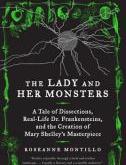 The Lady and Her Monsters: A Tale of Dissections, Real-Life Dr. Frankensteins, and the Creation of Mary Shelley's Masterpiece
The Lady and Her Monsters: A Tale of Dissections, Real-Life Dr. Frankensteins, and the Creation of Mary Shelley's Masterpiece
Roseanne Montillo
The Lady and Her Monsters brings to life the fascinating times, startling science, and real-life horrors behind Mary Shelley’s gothic masterpiece, Frankenstein. Montillo recounts how — at the intersection of the Romantic Age and the Industrial Revolution — Shelley’s Victor Frankenstein was inspired by actual scientists of the period.
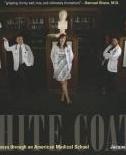 White Coats: Three Journeys through an American Medical School
White Coats: Three Journeys through an American Medical School
Jacqueline Marino
Although we rely on physicians, rarely do we consider the personal challenges faced by doctors-to-be. In 2005, Marino chronicled the experience of three students as they learned to be doctors at Case Western Reserve University School of Medicine.
 Fifty Plants that Changed the Course of History
Fifty Plants that Changed the Course of History
Bill Laws
A beautifully presented guide to plants that have had the greatest impact on human civilization. Entries feature a description of the plant, botanical name, native range and primary functions -- edible, medicinal, commercial or practical.
 Medicine Men: Extreme Appalachian Doctoring
Medicine Men: Extreme Appalachian Doctoring
Carolyn Jourdan
A collection of the most memorable moments from old-school rural physicians who each practiced medicine for more than 50 years in the Southern Appalachian Mountains.
Suggestions for purchases? Complete our online Recommend a Purchase form or contact Emma Cryer. For a complete list of titles added to our book and ebook collections within the last 3 months, check out the Library's newest book additions or subscribe to our "New Books" feed.
Explore: Scopus
Leila Ledbetter, Research & Education
Scopus
Abstract and citation database of peer-reviewed literature!
Features
• Contains 47 million records, 70% with abstracts.
• Over 19,500 titles from 5,000 publishers worldwide
• More than 4.9 million conference proceedings; 1,200 open access journals
• 100% PubMed (Medlne) coverage
- 20+ million records back to 1996 with references
- 20+ million pre-1996 records back to 1869
• Results from 386 million scientific Web pages
• GetIt@Duke links to full-text articles and other library resources
• Alerts to keep you up-to-date on new articles matching your search query or those by your favorite author
How is Scopus different from PubMed (Medline) or Web of Science?
Scopus covers all of the journals in PubMed (Medline) plus numerous additional titles. Like Web of Science, Scopus provides information about cited and citing articles and is interdisciplinary covering medicine, chemistry, physics, mathematics, engineering, social science, psychology, economics, and biological, agricultural, and environmental sciences.
However, Scopus does contain more content than Web of Science and has a noticeable European bias. Scopus provides information on all articles in Scopus that have cited an article. For articles published from 1996 to the present, Scopus provides a list of articles cited in the bibliographies of each article. Both citation lists allow users to link immediately to related research published prior to and after a particular article.
For more details, connect to the Scopus Website.
Please join us on October 16, 2013 for a Scopus Training Session with Elsevier!
For more information or to register for the event, click here! |
Journal Cancellations: We Need Your Feedback!
Pat Thibodeau, Associate Dean for Library Services & Archives
Emma Cryer, Associate Director, Collection Services
Since the costs of journal subscriptions rise by 6% to 10% every year, we have to make difficult decisions about what to keep and what to cancel. We look at usage, cost, and other factors. We also compare titles based on cost per use of all downloaded journal articles.
The following titles are potential cancellations based on high cost and low use, thereby having high cost per use as compared to hundreds of other titles. Please send any concerns about these cancellations to: medical-librarian@duke.edu.
| Current Eye Research Cytoskeleton International Journal of Health Services Library & Archival Security Nature Reviews Cardiology Nature Reviews Clinical Oncology Nature Reviews Endocrinology | Nature Reviews Gastroenterology & Hepatology Nature Reviews Nephrology Nature Reviews Neurology Nature Reviews Rheumatology Nature Reviews Urology Psychology & Psychotherapy Scandinavian Journal of Gastroenterology |
Open Access Week: October 21- 27

International Open Access Week will be celebrated Oct. 21 – 27, 2013!
Why Open Access (OA)?
Open Access contributes to new discoveries, collaborations, and partnerships, without the usual obstacles or cost of traditional published literature.
OA publications ensure that information is readily available to:
• Students at all levels of learning
• Faculty involved in teaching and scholarly research (regardless of location)
• Health care professionals in rural or underserved communities
• Colleagues in global settings that have limited access to libraries and information resources
• Patients and the general public
Here are some important reminders about your role in Open Access at Duke
- Fully participate in Duke’s OA Policy (2010) - Each faculty member grants the University permission to make scholarly articles available through a public repository (database) of manuscripts, fulfilling the Faculty of Duke University’s commitment to disseminating its research and scholarship.
- Deposit your manuscripts into DukeSpace to support the policy above and ensure that your students and colleagues have access to your work!
- Apply for Duke’s COPE funds when choosing an Open Access journal!
- Select an Open Access journal in the future. Use the Directory of Open Access Journals to find a title in your field and check on OA policies, or call the Medical Center Library & Archives (919.660.1100) for advice.
- Talk to colleagues about the importance of OA publications! Visit the OA Week Website for talking points and resources.
For more information about OA, connect to our guide on Open Access and Scholarly Communications @ Duke.
New Archives Blog
Jolie Braun, Assistant Director and Archives Librarian for Research, Outreach & Education
The Duke University Medical Center Archives is happy to announce the launch of their new blog at http://archives.mc.duke.edu/blog!
Here, Archives staff will post regularly to:
- Share stories about the history of the DUMC community
- Highlight interesting images, artifacts, and documents from the collections
- Provide information about resources, services, news, and events.
We hope you will check back frequently!
Trent Room: Historical Treasure Being Renamed
Pat Thibodeau, Associate Dean for Library Services & Archives
The Trent Room has been part of Duke Medical Center and the Medical Center Library for over 50 years. This room was donated by Mary Duke Biddle Trent Semans and Karl Bock in 1956 to house the rich and valuable works in the Josiah C. Trent, MD, History of Medicine Collection. However, the room itself is much older! It was a 1720 period room from the Richmond House in Plaistow England, which was once the seat of the Duke of Richmond. The room was brought piece by piece to Durham and reassembled at Duke.
Initially installed in the Duke Hospital Library on the ground level of the Davison building, it was a quiet research and study area for students and faculty. When the Seeley G. Mudd building was opened in 1975, the room was taken apart and reconstructed on the Lower Level of the Library (now Level 1). It continued to be a strong tie to the Duke, Trent, and Semans families, showcasing the Trent collection and many rare artifacts that were part of the History of Medicine Collections. In 2011, the collections and artifacts moved to the Rubenstein Rare Books & Manuscript Library on main campus, but the Trent Room remained behind.
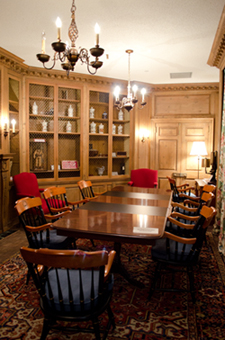 While the physical room will not travel to a new location, it will get a new name that reflects its origins: The Richmond House Room. The name change will become official as of January 1, 2014. In addition to housing medical artifacts from the Medical Center Library & Archives collections, The Richmond House Room will be available for meetings and studying.
While the physical room will not travel to a new location, it will get a new name that reflects its origins: The Richmond House Room. The name change will become official as of January 1, 2014. In addition to housing medical artifacts from the Medical Center Library & Archives collections, The Richmond House Room will be available for meetings and studying.
A new Trent Room has been planned as part of the renovations of the special collections area in the Perkins Library. The Rubenstein Library will be constructing a new space for the Trent Room to continue to house selections from the Trent Collection.
As we say farewell to the Trent Room name, we honor the important history of the Trent Room to Duke Medicine and Duke University, as well as it connections to the Trent and Semans families, who still cherish the room. Watch for more information about the room and its history on our Website, blog, and special guide to our Medical History and Special Collections.
Library Exhibits: Henkel Physicians - Aesculapian - Med Images
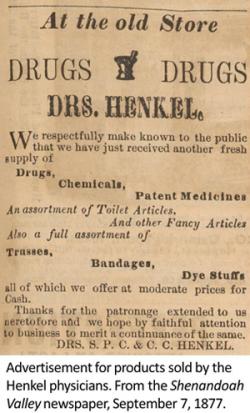
Currently on Display!
Henkel Physicians - Level 1
Jolie Braun, Assistant Director and Archives Librarian for Research, Outreach & Education
The Medical Center Library & Archives exhibit, "From the Rubenstein Collections: Henkel Family Physicians," will remain on display through October 2013. A collaboration with the David M. Rubenstein Rare Book & Manuscript Library, this exhibit traces a family of physicians in the Shenandoah Valley during the 19th century and features rare books and manuscripts along with materials from the History of Medicine Collections. It includes letters written by the Henkels, books and broadsides published by the Henkel Press, and 19th century medical instruments and artifacts.
To learn more about the Henkel family and 19th century medicine, visit NLM's digital exhibit, Physicians' Lives in the Shenandoah Valley: Henkel Family Letters, 1786-1907. To learn more about the Rubenstein Library and its collections, visit their Website.
Duke Aesculapian - Level 3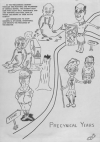
Pat Thibodeau, Associate Dean for Library Services & Archives
The School of Medicine’s Yearbook collection is highlighted from its beginnings and through 1969. The exhibit will be on display through December 2013.
Coming Soon!
An Eye for the Eye: Medical Illu stration at Duke, 1932-2005 - Level 1
stration at Duke, 1932-2005 - Level 1
Matthew Shangler, Assistant Archivist, Medical Center Archives
Opening in November, the Library will feature an exhibit showcasing the History of Medical Illustration at Duke, including original artwork by artists Bob Blake and Frank Beresford. The exhibit will be on display from November 2013 through February 2014.
Writing an NIH Funded Article?
Pat Thibodeau, Associate Dean for Library Services & Archives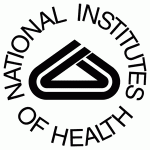
If you are getting ready to submit a journal article funded by the National Institutes of Health (NIH), you may want to consider these tips.
NIH Public Access Policy Requirements
- All manuscripts must be submitted for journal articles accepted for publication from an NIH award or contract
- Peer-reviewed and edited versions of manuscripts must be deposited by the author, co-author or PI
- Manuscript submission and compliance MUST be completed within 3 months of the publication date
- Manuscripts must become available to the public within 12 months (the longest period that a journal can require that the manuscript not be available)
Selecting a journal? Investigate these issues...
- Does the journal allow compliance with the NIH policy?
Read through the agreement and make sure the journal allows this. If it's not clear, demand they allow it.
- Some publishers have a separate addendum or document to request permission to submit this.
- Will the journal submit the manuscript to NIH for you?
- Check to see if there is a fee to submit the final published version. The journal usually submits immediately for a fee, ensuring you are compliant.
- You do NOT have to pay a fee unless you want to. You can still choose to submit it yourself and avoid any fees.
- If there is no fee, be sure the publisher will submit to NIH in a timely manner to be compliant (at least within 3 months after the publication date)
- If you're not sure the deposit will be within 3 months of publication, you may want to submit your version. If submitted later, the publisher’s version will always replace the author’s manuscript.
- Will the journal notify you when the article is submitted to NIH?
- Will they send you the interim NIHMID number, which shows you are trying to be compliant?
Journal Submission Methods
- Journals that automatically submit the published article (Method A)
http://publicaccess.nih.gov/submit_process_journals.htm
- Easy option, but limited number of journals
- Journals that you can ask to submit the final published article BUT usually for a fee (Method B)
http://publicaccess.nih.gov/select_deposit_publishers.htm#b
- Longer list but can be expensive, costing up to $3,500 for the service
- Journals that submit a manuscript that you have to approve (Method D)
http://publicaccess.nih.gov/select_deposit_publishers.htm# OR check the publishers Website
- If open access, you may find the journal and its policy listed at www.doaj.org
- If you do use one of the options above, you must deposit the final peer-reviewed manuscript in PubMed Central yourself via the NIH Manuscript Submission System (Method C)
Jeremy Greene Speaks at Duke
Rachel Ingold, Curator, History of Medicine Collections, Rubenstein Rare Book & Manuscript Library
 Jeremy Greene, M.D., Ph.D. |
Wednesday, October 23, 2013
Imitation and Innovation: A Brief History of 'Me-Too' Drugs
12:00-1:00 pm; Trent Semans Center - Great Hall
Trent History of Medicine Lecture
The Materiality of the Brand: Form, Function, and the Pharmaceutical Trademark
5:30 pm; Perkins Library - Room 217
Reception will follow the lecture
Dr. Jeremy Greene is Associate Professor, Elizabeth Treide and A. McGehee Harvey Chair in the History of Medicine at the Johns Hopkins University’s Institute for the History of Medicine. His broader research interests focus on the history of disease, the history of global health, and the relationship between medicine and the marketplace. Dr. Greene also practices internal medicine at the East Baltimore Medical Center and the Johns Hopkins University Hospital. He has published on a wide variety of topics and his most recent book with Elizabeth Siegel Watkins is titled, Prescribed: Writing, Filling, Using, and Abusing the Prescription in Modern America, Johns Hopkins University Press, 2012.
Dr. Greene’s talk on the "The Materiality of the Brand" will explore the limits of patents and trademarks in the sphere of pharmaceutical intellectual property, and illuminate a century of controversy over the clinical, public health, and financial value of “look-alike drugs,” generic drugs that imitated their brand-name counterparts down to exact parameters of size, shape, and color. His historical analysis addresses thorny questions about which qualities of a brand-name drug are considered private property and whether parts of a drug other than its active ingredients (e.g., pill color) can affect its clinical function.A reception will follow the lecture.
Sponsored by the History of Medicine Collections, the John W. Hartman Center for Sales, Advertising & Marketing History, and the Trent Center for Bioethics, Humanities & History of Medicine.
For more information, please contact Rachel Ingold at 919.684.8549 or rachel.ingold@duke.edu.
Staff News

Pat Thibodeau, Associate Dean for Library Services & Archives, presented at the National Insitutes of Health (NIH) PubMed Central Advisory Committee meeting in June. Pat, who serves as Chair of the Advisory Committee, reported on Duke’s experience with the NIH Public Access Policy.
Medical Center Library & Archives staff will present the following initiatives during the Annual Meeting of the Mid-Atlantic Chapter of the Medical Library Association in Pittsburgh, PA, October 13-15, 2013.
Emily Mazure, Pat Thibodeau, Leila Ledbetter, Brandi Tuttle, Karen Grigg, and Megan von Isenburg - Assessing the Information Needs of Early-Career Biomedical Researchers (paper)
Emily Mazure, Adrianne Leonardelli, Beverly Murphy, Pat Thibodeau, Connie Schardt, Emma Cryer, Rick Peterson, and Virginia Carden - NIH Public Access Policy: An Opportunity to Support Researchers (paper)
Amanda Chiplock, Kimberley Barker, Mary Mauldin, Alisha Miles, Megan von Isenburg, Andrea Wright, and Andrew Youngkin - Emerging Technologies Help Bridge the Gap between Health Information & the Community (poster)
Megan von Isenburg, Kimberley Barker, Amanda Chiplock, Mary Mauldin, Alisha Miles, Andrea Wright, and Andrew Youngkin - Identifying Barriers to Break Technological Boundaries- A Needs Assessment of Regional Medical Librarians (poster)
Farewell to Dawne Lucas
Jolie Braun, Assistant Director and Archives Librarian for Research, Outreach & Education
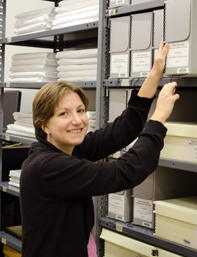
In September, the Library bid farewell to Dawne Lucas, Head of Technical Services for the Medical Center Archives. Dawne joined the Medical Center Library & Archives staff in January 2007. Before coming to Duke, she had worked as a Library Associate at North Carolina State University’s Special Collections Research Center and as a Research Assistant at the University of North Carolina-Chapel Hill’s Southern Historical Collection. She received an MSLS from UNC-Chapel Hill and an MA in public history from NCSU.
During her 6½ years at the Archives, Dawne oversaw the growth and development of the Archives' technical services. Her duties included processing and cataloging materials, working with donors and departments to accession new materials, and training and supervising interns. One of her major accomplishments was implementing a new collection management system and patron registration database for the Archives, which made collections more discoverable and allowed staff to improve their ability to track researchers’ needs. Dawne organized the Archives’ collection of over 200 oral histories and and made it more accessible. She also made the architectural records collection available by creating an inventory and rehousing materials, and most recently, helped manage the migration of images and metadata to the Archives’ new version of MEDSpace, its digital image database.
While she oversaw many changes at the Archives, Dawne feels that her colleagues have seen her through important events in her own life as well, including getting married and having her daughter. When asked what she will miss most about the Library, Dawne cited coworkers, donors, and DUMC staff that she worked closely with over the years.
In October, Dawne will begin her new position as Special Collections Librarian at UNC-Chapel Hill’s Health Sciences Library. We wish her the best of luck as she embarks on this exciting new stage of her career.
Thanksgiving Holiday Hours
November 27 (Wednesday) 8:00 am - 6:00 pm November 28 (Thursday) BADGE ACCESS ONLY November 29 (Friday) 10:00 am - 6:00 pm 24-hour card access is available to Duke Medicine Badge Holders Only. |
Improve Your Library Research Skills!
The Medical Center Library offers training on a variety of topics. Sign up for an upcoming class, customize your own, or schedule an appointment for a research consultation.
Publication Schedule & Staff
Duke University Medical Center Library & Archives News is published bimonthly.
| Pat Thibodeau, Associate Dean | Beverly Murphy, Editor |
| Editorial Board: | |
| Jolie Braun | Barbara Dietsch |
| Adrianne Leonardelli | Megan von Isenburg |
Subscribe to our newsletter and be notified when a new issue is published!

 Thanksgiving Hours
Thanksgiving Hours